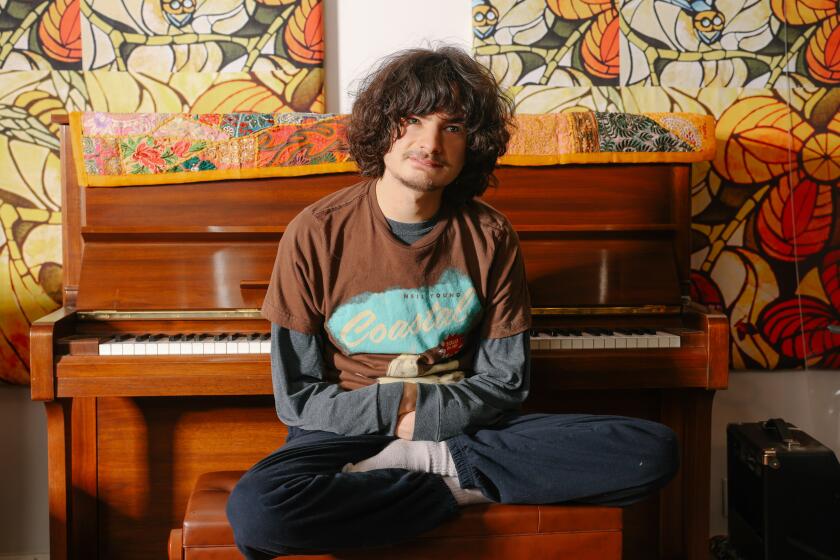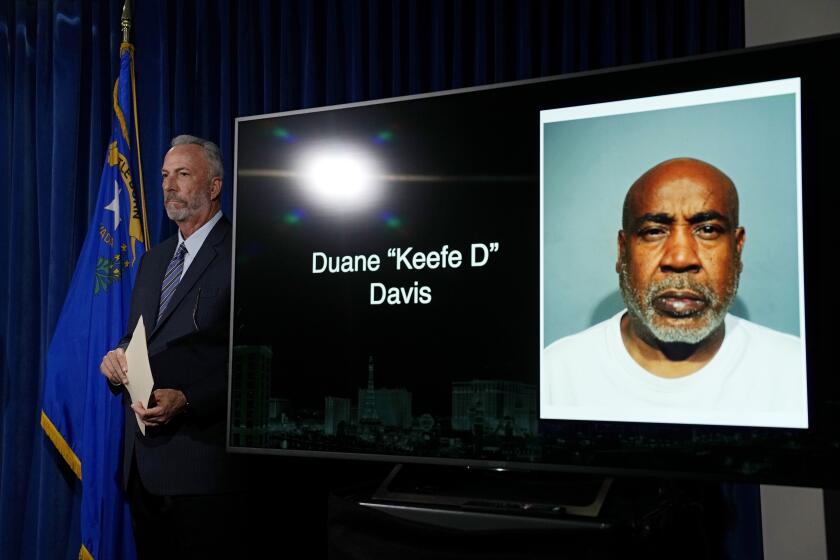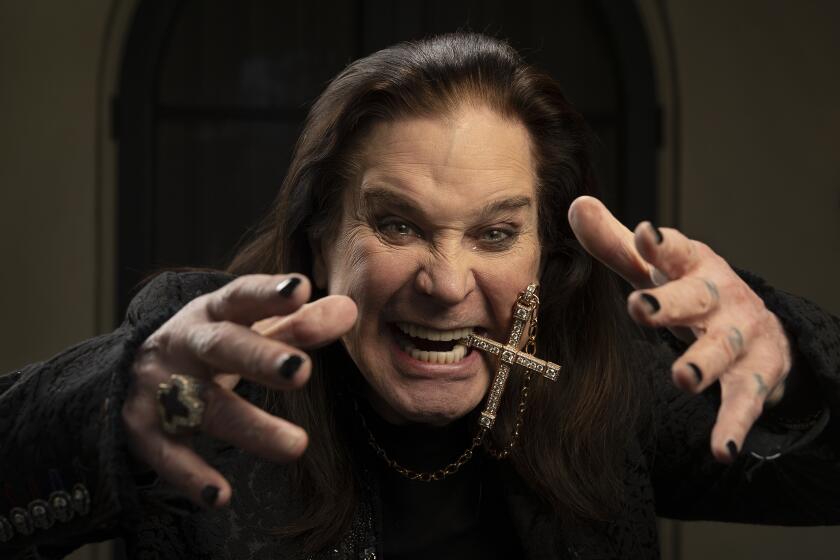Earl Sweatshirt and the Alchemist’s mystery project finally comes to light
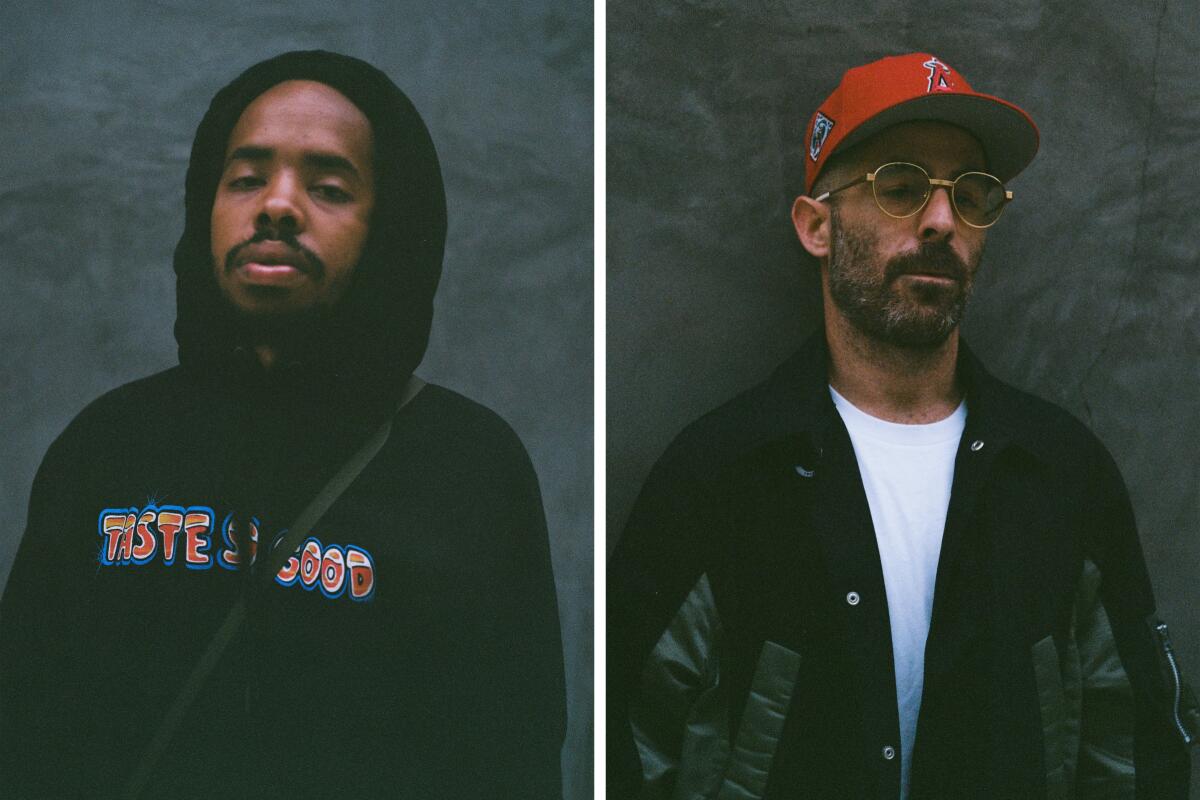
- Share via
“Voir Dire,” the title of the new album from rapper Earl Sweatshirt and producer the Alchemist, translates from French as “speak the truth” — a concept that’s all too familiar to its creators.
Ten years ago, Earl’s truths manifested as tangled fears and unanswered questions on his debut solo album, “Doris,” where he trudged through grief in the absence of his father, dealt with the guilt of missing his grandmother’s final days as he hustled to get his music career off the ground, and struggled with the weight of his own lofty expectations. After he stormed the internet in the late 2000s as part of the counterculture group of L.A. skaters, musicians and jokesters known as Odd Future — which also introduced the world to Tyler, the Creator and Frank Ocean — the dense rhyme schemes and layered bars of “Doris” presented him as the group’s brightest linguist, with wisdom beyond his then-19-year-old self.
“He was always exceptional,” said the Alchemist, 45, who worked on the album and for whom the track “Uncle Al” was named. “He was gifted from an early age.”
Jacob Rock has profound non-oral autism. But thanks to text-to-voice software and a music-loving dad, Rock transposed the sounds in his head to the concert stage.
Now a few months removed from the album’s 10-year anniversary celebration concert at the Novo, Sweatshirt, born Thebe Kgositsile, has reconnected with the Alchemist on “Voir Dire,” initially released on Gala Music as an NFT and now arriving to all streaming services. The project is years in the making: As far back as 2019 and again in 2021, the Alchemist (real name Alan Maman) posted on social media that he and Earl had not only finished a project but uploaded it to YouTube under fake names on a fake page, challenging fans to find it.
“It doesn’t seem like people came close to finding it,” said Sweatshirt, 29, contorting his face into a mischievous smile.
On a mid-September afternoon in Santa Monica, the two roll spliffs in the control room of the Alchemist’s studio, the same room where Earl created much of “Doris” and his later output. He eagerly remembers honing his craft here, alongside some of rap’s sharpest minds. These days, he’s found purpose in his 3-year-old son and joy in his partner, Aida Osman, who writes and stars on HBO’s “Rap S—.”
“She made me make a Mariah Carey drill beat the other day,” Sweatshirt said. “That s— was hot. We bounce a lot off each other.”
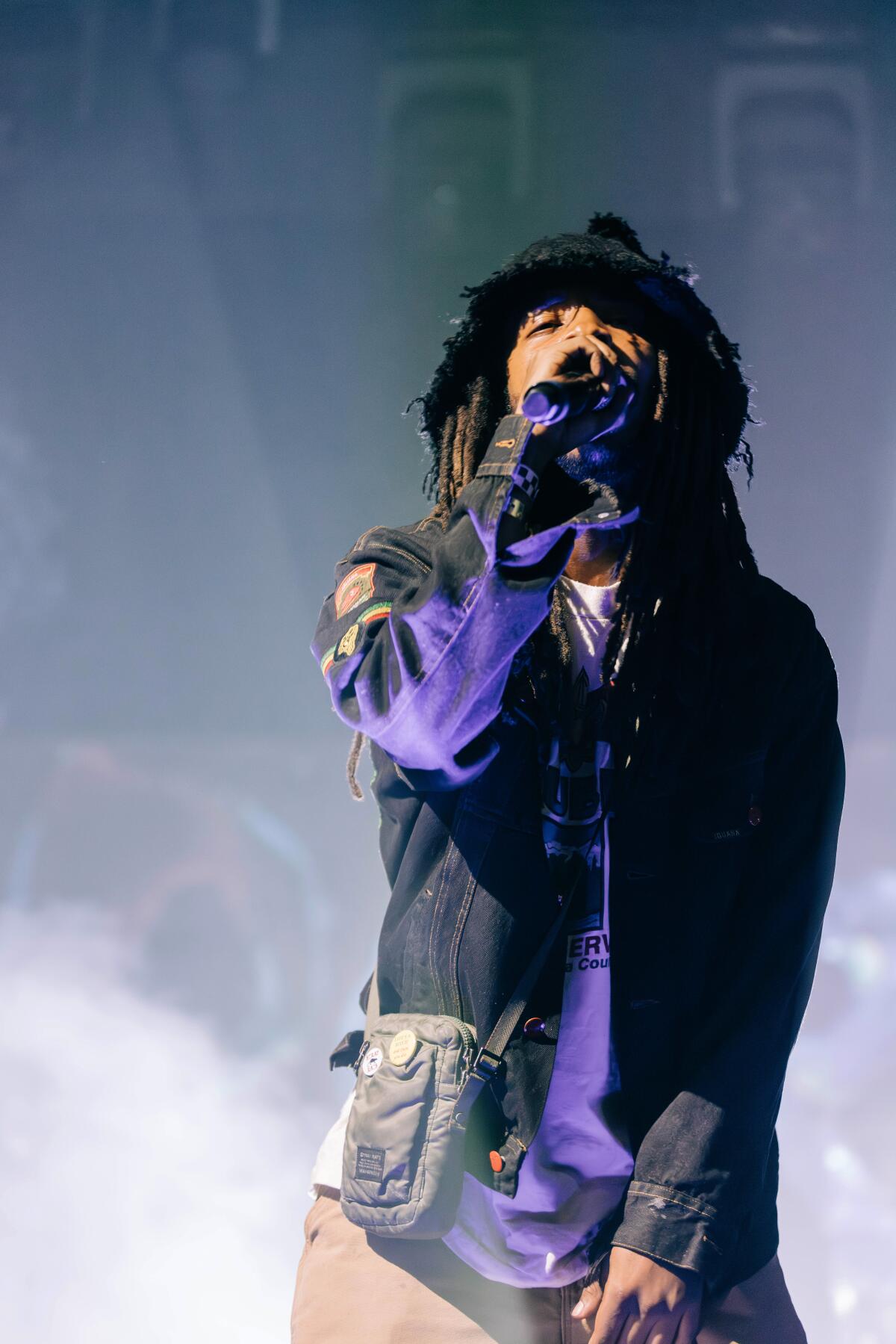
Fans have been searching for the “hidden” Earl Sweatshirt and Alchemist album for years. When did you actually make this project?
Earl: Forever, I’m not gonna lie. There’s stuff from last month, there’s stuff from five years ago. It’s something we carved out for ourselves, by really taking our time with it, instead of being pressed to put it out.
Alchemist: I think the whole “lost album” that people were trying to find was an indicator to me. It grew into an animal on its own. There was no thought put into it, we were just f— around. But seeing how people took to it made me trip out. We’re in the era where everyone’s making their own conspiracy theories, everyone’s on YouTube, everyone wants to be the sleuth who uncovers it.
A scavenger hunt, complete with QR codes on the tags of tour merch and a series of online riddles, led fans to an early, collectible version of the album on Gala Music last month. This week, you’re bringing it to all streaming services. How would you grade the experiment?
Earl: I’m just glad [Gala Music] weren’t pressed on exclusivity. Obviously fans would be tight, because there appears to be a wall of accessibility around the album, which is maybe facts. I’m the type of n— who’s so anxious, so neurotic, that if a n— tells me to look for some s—, I’m like, no.
I get it on one hand, but we also didn’t Shkreli this. [Pharmaceuticals speculator Martin Shkreli famously bought the only existing copy of a new Wu-Tang Clan album for $2 million in 2015.] We put it online, too.
Alchemist: It was important that fans could hear the music. You don’t have to buy nothing, this is it. Because we didn’t want it to feel like we were making things too difficult.
Earl: But really what’s funny is, all you gotta do is say, “Hey bro, you gotta go to this website that you’re not familiar with to hear it.” And they were like, “Nah.”

A whole generation was born into streaming. You think it’s possible to detach fans from Spotify dependency?
Earl: It’s impossible. It’s like when you show a baby chicken nuggets, it’s over. You can’t even be mad at someone for liking it because it’s designed for them.
Alchemist: I don’t think that was the goal for this project, either. We were never trying to “defeat” the streaming services. It was more of a clever way to roll out a project and get some engagement with the ones who’ve been looking for this for two years. It was like a soft open for the super fans.
Some fans complained about the NFT, because they’re bad for the environment and increasingly worthless as investments. Had you guys been involved in that space before?
Earl: Hell no. I’m still not into that scene. But fans could either buy it via Gala or listen later on streaming, I feel like that’s the most respectful way to go about it.
Alchemist: We wanted to do a rollout that added another layer to the experience, that wasn’t just “press play.” Gala Music thinks out of the box.
Earl: They don’t have established norms yet, for better or for worse.
What inspired the title “Voir Dire?”
Earl: There was something about the aesthetic and how the words looked with each other, I like that s—. It has a strong look. And also, I had all this legalese in my head from my mom, who is a law professor. It’s fond memories for me of when I was younger, it has the sentimental value. And on the nonsentimental things, the direct translation is “speak the truth.” You could say anything. You could say, “I had butter beans for breakfast,” if you really did.
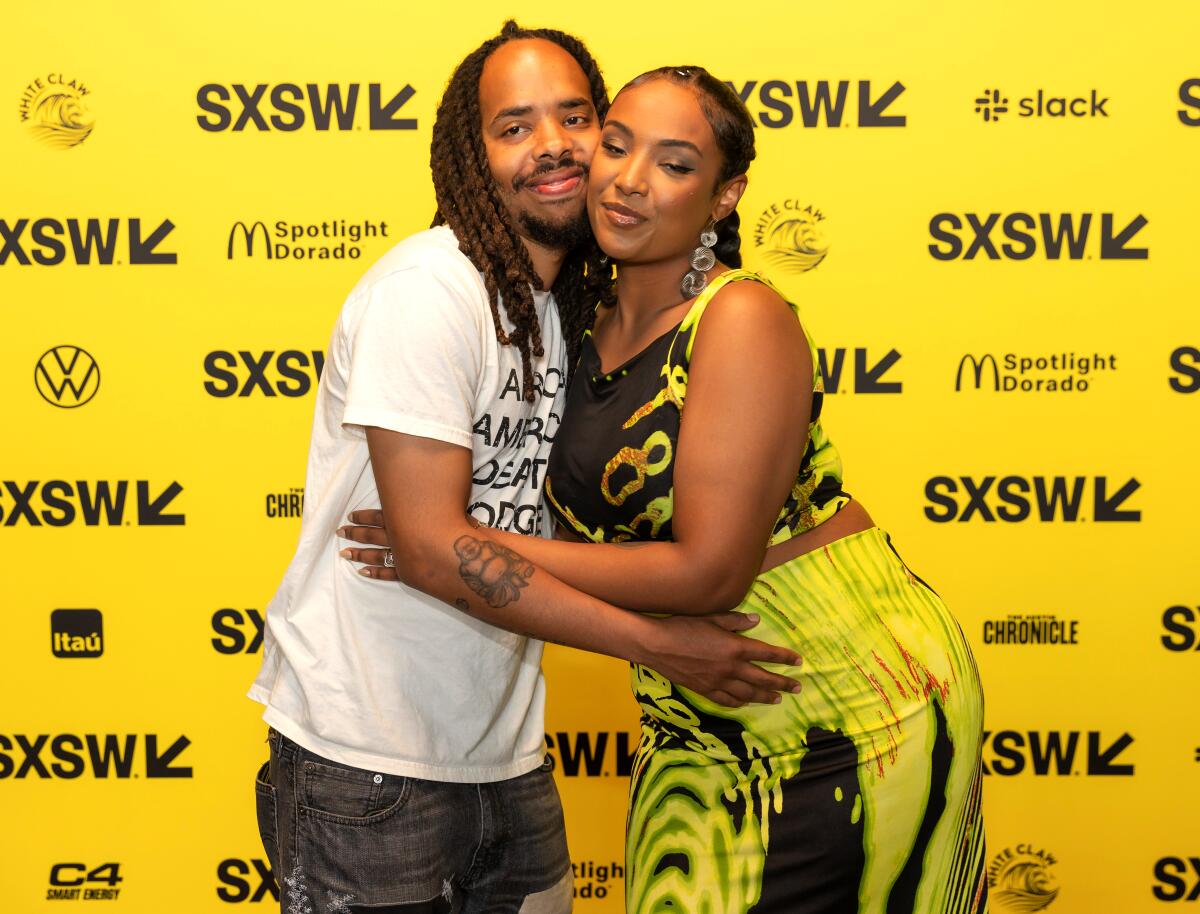
Al, you’ve done a lot of collab tapes, including one with Larry June and another with Mike and Wiki this year. What was unique about creating this one with Earl?
Alchemist: He’s such a super-high-level MC. Always been. He’s one of them ones. Everybody who knows, knows.
Earl: When I first came to Al’s studio, I was scared of the world. And of all the pressures and stuff that comes with this rap s—. But I could come over here, and just be with rappers in a rap environment. The same environment I grew up rapping in. I can’t imagine if I didn’t have this. Because it wasn’t just recording — learning how to make beats, learning how to sample. I was really immersed in rap as a cultural thing. Al’s environment always keeps me sharp.
In his 2019 memoir and in several interviews, Davis admitted to riding in the car from which the fatal shots were fired at the Los Angeles hip-hop legend. Davis was taken into custody Friday morning.
What were the early days in this studio like, back in 2013?
Alchemist: [This studio] was a really good incubator spot for a lot of the young homies. They’ll tell me it was an important phase of their career. They would come over, and maybe it’s Chuck English in the other room, or me making beats. Prodigy was over here a lot, or Evidence, or Action Bronson. ScHoolboy Q was coming around, Thebe was bringing Vince [Staples] over, it was a crazy mixture.
Earl: Al let me grow up in here. It really was not forced, ever. Just whenever it happens, it happens. We had the freedom to work like that.
What did it feel like to be back onstage at the “Doris” anniversary show, rapping music from 2013?
Earl: I f— hated it. It was cool, but it’s a weird feeling. ’Cause I’m not connected to a lot of the stuff, so saying stuff you don’t mean is weird. But that’s the assignment. You get judged at a concert by how much you mean what you’re saying. And it’s a guarantee I didn’t really mean what I’m saying.
Why’d you decide to do it?
Earl: Duty, respect. I respect ceremonies and karma. I did it, I gotta deal with it. Know what I mean? [Laughs]
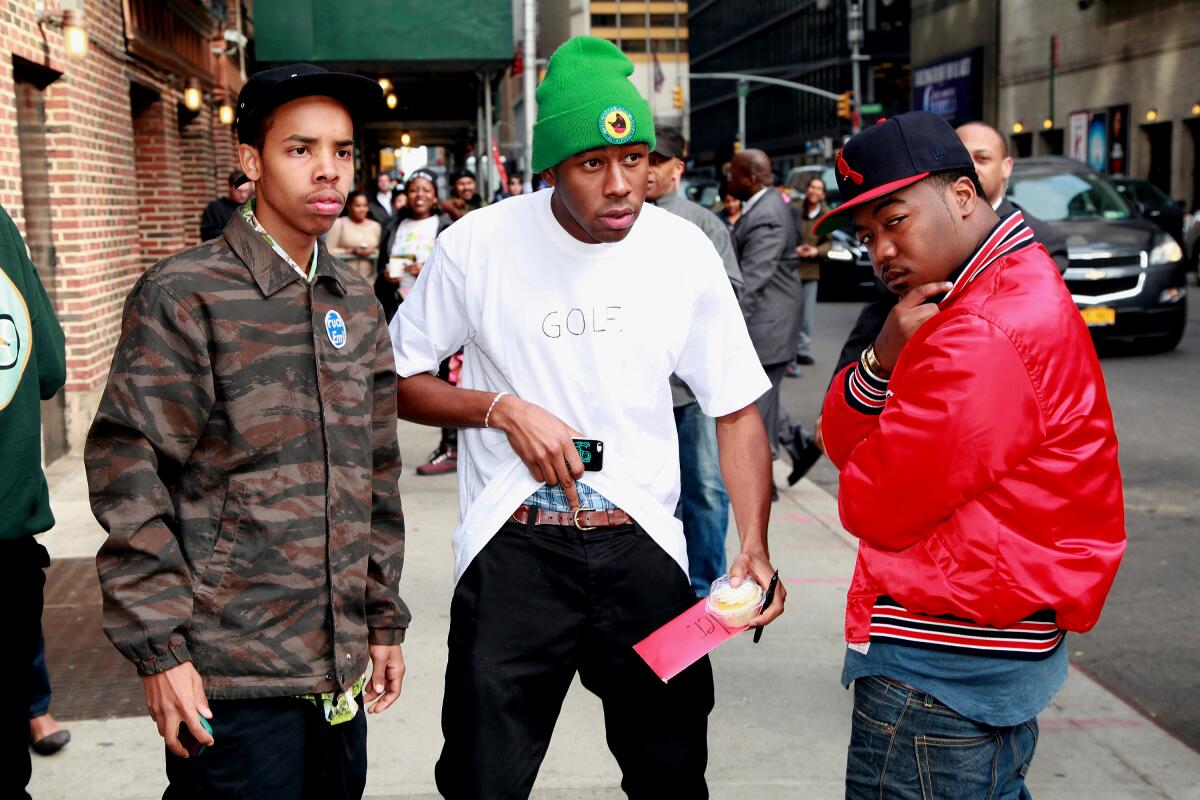
Tyler, the Creator popped out to rap his verse from “Woah,” and the photo of the backstage Odd Future reunion spread like wildfire online. Was there joy in seeing everyone?
Earl: Oh, yeah. Don’t let me hype up the negativity. It’s beautiful, everyone’s got their own tree. It was beautiful to come together.
How would you compare your life from then to now?
Earl: Oh s—. That’s a tall order. In 2013, I was doing the music stuff, but I was still trying to get ads in Thrasher, on some skateboard s—. Even how I was living … boards on the wall at the door, very dirty house, young n— out here pretty confused. Not really eating food, living skating distance from the studio. I’m pretty sure I didn’t wear a shirt. Slapboxing every day.
That’s very specific.
Earl: Yeah. But I’m domesticated now. I wear a shirt. I’m doing laundry. House is clean, burning incense. And I’m proud of my son, I’m thankful he’s around. I’m thankful for my girl. I’m thankful for them for making me into something I’m proud of.
More to Read
The biggest entertainment stories
Get our big stories about Hollywood, film, television, music, arts, culture and more right in your inbox as soon as they publish.
You may occasionally receive promotional content from the Los Angeles Times.
